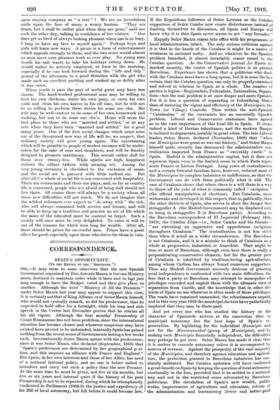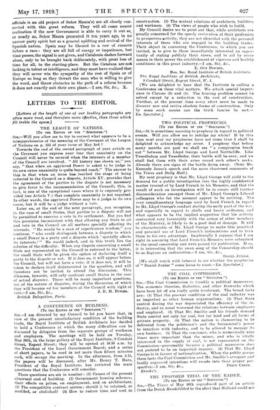.CORRESPONDENGE.
SPAIN'S OPPORTUNITY.
[To THE EDITOR OF THE " SPECTATOR."] STH,—It may seem to some observers that the new Spanish Government organized by Don Antonio Maura is but one Ministry more, destined to maintain order while it lasts and to lait, just long enough to have the Budget voted and then give prase to another. Although the brief "Ministry of All the Premiers" under Seiler Maura last year may appear to support this view, it is certainlynot that of King Alfonso or of SefiorMaura himself, who would not cynically remark, as did his predecessor, that he expected to hold office for a fortnight, while his long and able speech in the Cortes last December proves that he retains all his old vigour. Although the four months' Premiership of Count Romanones has not been profitless, since the international situation has become clearer and whatever suspicions may have existed have proved to be unfounded, intemallySpainhas gained _ nothing from the recent series of Governments lasting a few weeks each. Internationally Sexier Maura agrees with his predecessor, since it was Seiler Mauro, who declared (September, 1916) that "Spain's preferences are determined by her geographical pzsi- tion, and this imposes an alliance with France and England." But Spain, in her own interestrand those of her Allies, has need of a national internal policy, and no one is better suited to introduce and carry out such a policy than the new Premier, At the same time he must be given, not five or six months, but five or six years and internal quiet if the history of his past Premiership is not to be repeated, during which he triumphantly vindicated in Parliament (1908-9) the justice and expediency of his Bill of local autonomy, bat fell before it could become law. If the Republican followers of Seiler Lerronx or the Catalan supporters of Seller Cambo now create disturbances instead of limiting themselves to discussion, all Spain and Europe will know why it is that Spain never seems to get "any forrader."
Happily Sefior Maura comes into office with his programme of local administration intact. The only serious criticism against it is that in the hands of the Catalans it might be a source of weakness to national unity. And so, whatever be the Spanish problem broached, it almost invariably comes round to the Catalan question. As the Conservative journal La Epaca re. marked recently, the centre of Spanish polities is at present Barcelona. Experience has shown that a politician who deals with the Catalans must have a long spoon, but it is none the less certain that the Catalan question can only be properly examined and solved in relation to Spain as a whole. The number of parties is legion—Regionalists, Federalists, Nationalists, Sepsis. tists—but the real problem is at once deeper and more Spanish. For it is less a question of separating or federalizing States than of restoring the vigour and efficiency of the Municipioa, the Town (or Village) Councils. Thus within the anti-Spanish " Catalanism " of the extremists lies an essentially Spanish problem. Liberal and Conservative statesmen have agreed as to the vast importance of this local life in Spain. It seems indeed a kind of Iberian inheritance, and the modern Basque is inclined todegenerate, notably in great cities. The late Liberal leader, Sefior Moret, declared (November, 1909) that "when our Municipios were great so was our history," and Sefior Mama himself quite recently has denounced the administrative cen- tralization imported from France as "execrably exotic" in Spain. Madrid is the administrative capital, but it does not represent Spain even in the limited sense in which Paris repre- sents France or Lisbon Portugal. Long years of centralization and a certain Oriental fatalism have, however, reduced most of the Municipios to complete indolence or indifference, so that the Government can do with them politically what it will. The case of Catalonia shown that where there is a will there is a way to throw off the yoke of what is commonly called " eaciquism " (the official manipulation of elections). But Catalonia, more vrideawake and developed in this respect, that is, politically, than the other districts of Spain, also serves to show the danger that stringpuller A (the Madrid Government) may be displaced only to bring in stringpuller B (a Barcelona party). According to the Barcelona correspondent of El Imparcial (February 16th, 1919), the Catalan Seiler Cambo and his friends- " are exercising an oppressive and opprobrious caciquism throughout Catalonia." The centralization is not leas strict than when it acted on a wider circumference. For Barcelona is not Catalonia, and it is a mistake to think of Catalonia as a whole as progressive, industrial, or Anarchist. That might be true at most of Barcelona, although even here there is really a preponderating conservative element; but far the greater part of Catalonia is inhabited by tradition-loving agriculturists, among whom Carlism has always found numerous supporters. Thus any Madrid Government sincerely desirous of granting local independence is confronted with two main difficulties, the fear that a party at Barcelona may attempt to monopolize all privileges conceded and exploit them with the ultimate view of separation from Castile, and the knowledge that in other dis- tricts of Spain no use whatever is often made of these privileges. The roads have remained unmended, the schoolmasters unpaid, and in this very year 1919 the municipal doctors have pathetically implored that they may be State-paid.
And yet every one who has studied the history or the character of Spaniards arrives at the conviction that in municipal autonomy lies the best hope Of Spain's re- generation. By legislating for the individual Municipio and not for the Mancomunidad (group of ,Municipios), and by making each Municipio financially independent, the difficulties may perhaps be got over. Sefior Maura has made it clear that it is useless to concede autonomy unless it is accompanied by sources of revenue. Against the prosperity of the vast majority of the Municipios, and therefore against education and agricul- ture, the protection granted to Barcelona industries has con- stantly militated. But Catalan agitation will have conferred a great benefit on Spain by keeping the question of local autonomy continually to the fore, provided that it-be settled in a-national way and not in the restricted sense advocated by Barcelona politicians. The circulation of Spain's new wealth, publie works, improvement of agriculture and education, reform of the administration and bureaucracy (fewer and better-paid officials is an old project of Senor Mauro's) are all closely con- nected with this great reform. They will all come nearer realization if the new Government is able to carry it out as, or nearly es, Seiior Mauro presented it ten years ago, in no narrow party spirit but as a general uplifting and revival of the Spanish nation. Spain may be likened to a row of runners before a race: they are all full of energy or impatience, but time passes, the signal is not given, and Catalonia dashes forward alone, only to be brought back deliberately, with great loss of time for all, to the starting-place. But the Catalans are not hacking in talent or intelligence, and they must have realized that they will never win the sympathy of the rest of Spain or of Europe so long as they thwart the man Who is willing to give the word, and throw obstacles in the path of a reform because it does not exactly suit their own plane.—! am-, Sir, &c.,



































 Previous page
Previous page